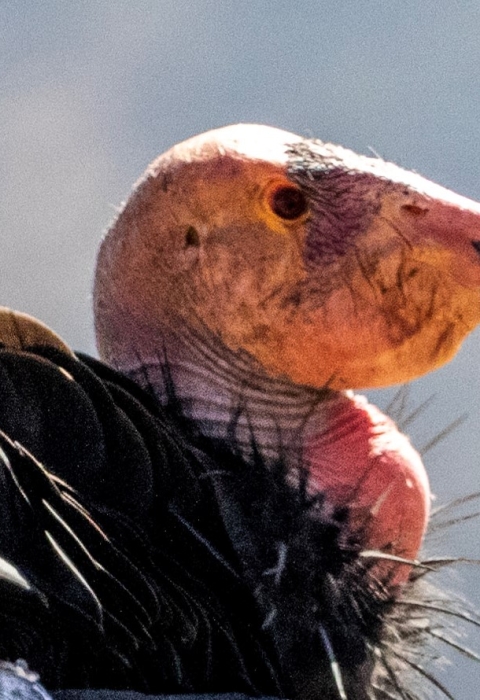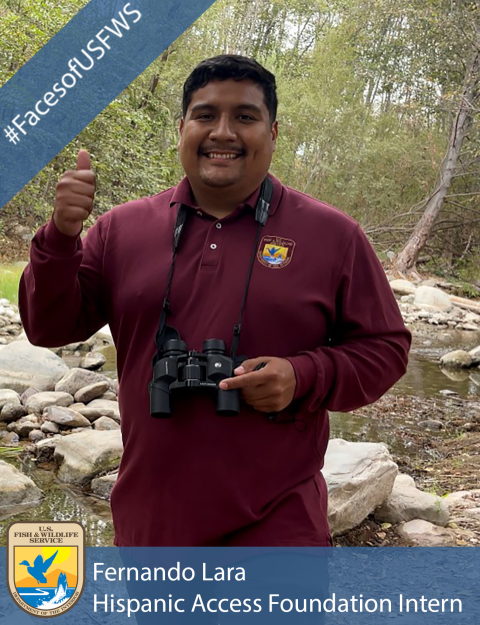Fernando Lara recently completed a Hispanic Access Foundation biology and Geographic Information System (GIS) internship at the Ventura Fish and Wildlife Office. He is interviewed by public affairs specialist, Vanessa Morales. Read on to learn about his path to wildlife conservation through geography.
VM: Hey Fernando! Can you tell me about your Hispanic Access Foundation internships?
FL: I started as a biology intern for six months, doing a lot of educational outreach, including joining the MERITO Foundation Beach Camp in Ventura to teach students about ocean ecosystems. I also helped create educational videos about different species and habitats that reside around the Ventura Fish and Wildlife Office jurisdiction. Additionally, I did a lot of technical writing like the species status of the California condor and an informal consultation for the Southern sea otter.
After that, I served as a GIS intern, and in this position, I was able to work on geospatial analysis with products the office uses. I got the chance to participate in a lot of field opportunities and visited the Guadalupe Nipomo Dunes National Wildlife Refuge where the staff and I worked on trail mapping for the refuge. They hope creating a new map will make the refuge more accessible to anyone who wants to visit it. I also visited the Bitter Creek National Wildlife Refuge to participate in California condor check ups. We worked with the Santa Barbara Zoo, and I got to see how data was collected and how they are trapped for lead testing.
VM: Sounds like you had great experiences!Can you tell me about where you went to school and what you studied?
FL: I attended California State University Long Beach and majored in Geography with a focus in GIS. I was especially interested in natural resource management.
VM: What made you want to pursue your major?
FL: My girlfriend is a school guidance counselor. She saw I was miserable in my business classes, because at the time I was pursuing a business administration major. She said, “You love maps and Google Maps, so why don’t you try switching your major to geography?” At the time, I didn’t know if there were employment opportunities as a geographer, but the school opened my eyes to the different fields I could get involved with. Sure enough, I switched majors and excelled. Overall, I did enjoy their geography program.
VM: What great advice from your girlfriend! Is there something or someone you can point to that sparked your interest in maps and the outdoors?
FL: The person who got me into maps was my dad. He used to go out of town for work, and we had just purchased a computer and internet. He did not have a GPS system in his truck, so he would call me on the phone, and I would be his navigator, live streaming him directions that I read from a map on the computer.
The reason I got into natural resource management is because I’ve always had a passion for conservation and being in the outdoors. I grew up watching Animal Planet and Discovery. I thought they were so cool. Also grew up going to my grandpa’s ranch in Mexico so I spent a lot of time outdoors and I loved it.
VM: Amazing! Can you tell me why you think it is important for Latinos to be involved in the outdoors and wildlife conservation?
FL: I do think it is important. My parents came here in 1992 and their whole background has always been rural living in Mexico, working the land, and I think it is important for us to follow those traditions we have, like living with the land. My family came from humble beginnings, but it is really disheartening to see a lot of the younger generations disconnect from nature. I think it's important for us to advocate for Hispanic and Latino communities to enjoy green spaces. I know many times there is a fear because of immigrant status, but it is important to show people what they could be missing out on. We need to encourage people to get out there more and make them feel comfortable. I know I had imposter syndrome and did not feel like I belonged, but the land and the outdoors are for everyone, so I grew out of that. However, I can see how that feeling could remain in others.
VM: Can you tell me about any memorable field opportunities you’ve had, either in your internship or during school?
FL: Yes, I did some professional development at a Pinnacles National Park when I was a biology intern. I got to meet the Superintendent and many amazing biologists who showed me around the park and their work. I spent a couple of days camping and got to see how they track the California condors. I learned about their interpretive program where rangers lead interpretive hikes with guests. I thought it was cool to see how all divisions of the park work together in harmony.
VM: Wow, sounds like it was a great opportunity! What’s next for you, Fernando?
FL: I did recently accept an offer for a permanent geographer position at the Ventura Fish and Wildlife Office. I am also planning on getting my master’s degree.
VM: Congratulations! Do you think your HAF internships with the USFWS solidified your choice to follow this career path?
FL: They did. With all the field opportunities and things I learned as a GIS intern, the experience definitely sealed the deal for my career path.
VM: Thank you so much for your time, Fernando! It will be great to see another HAF alumni at the office! See you soon




